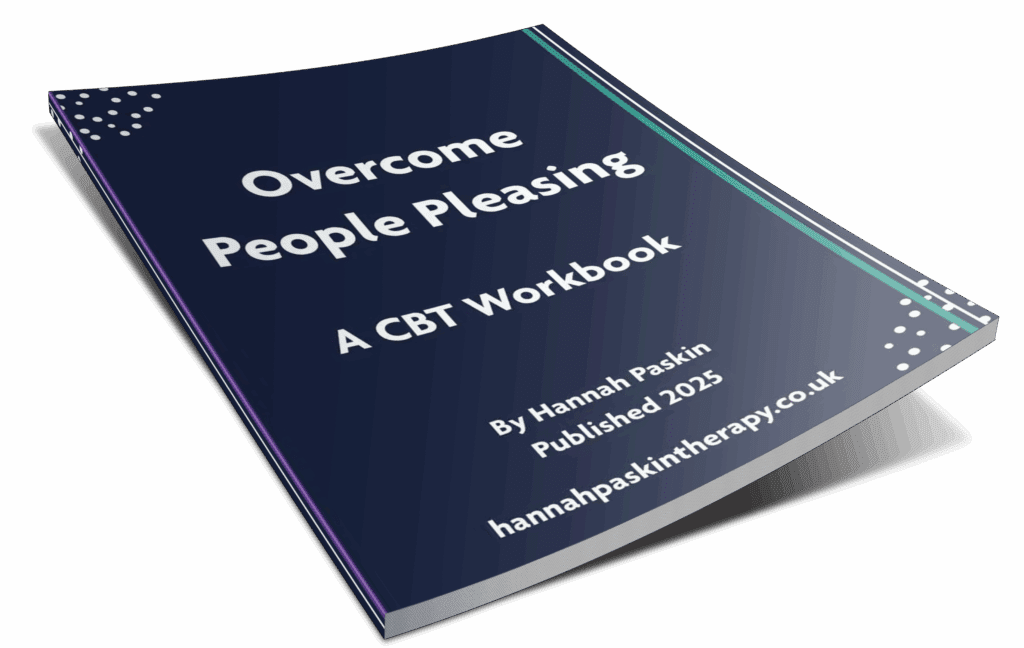Therapy for People Pleasers
Overcome People Pleasing & Reclaim your Life
Private CBT Therapist & Recovering People Pleaser

Therapy for People Pleasing
Do you feel overly responsible for other’s feelings? Find yourself sacrificing yourself to say yes to others? Always seem to be pulled into everyone else’s problems? Keep saying sorry all the time? Realise you’ve lost yourself in it all? If so you’re in the People Pleasers club.
I know what that’s like, because I’m a Recovering People Pleaser. Chronic People Pleasing is mentally, emotionally, and physically exhausting. Over time, it can lead to burnout, anxiety, stress and resentment – affecting both your professional and personal life.
Therapy for People Pleasers is highly effective. I help clients all the time to find a new way forwards.
Time to Reclaim Your Life?
How Therapy Helps You Put Yourself First
- Understand why you’re a people pleaser
- Break free from deep rooted patterns
- Overcome guilt and fear associated with saying no
- Set and maintain healthy boundaries
- Prioritise your own needs without feeling selfish
- Learn how to stop feeling responsible
- Understand how to step out of the helper role
- Gain confidence in expressing your thoughts, opinions and emotions
- Reduce workplace stress and overwhelm
- Tackle other associated problems like imposter syndrome and perfectionism
Recovering People Pleaser
I myself am a Recovering People pleaser. I’ve been there; I know what it’s like. In the past I’ve sacrificed myself at work, with friends, and financially; all due to the overwhelming need to look after other’s and not be an inconvenience.
I know how to Overcome People Pleasing, both because I’ve walked the walk, and because I’m a knowledgeable and experienced Private CBT Therapist.
Want to read my story? A recovering People Pleaser – A Therapist’s Story
Ready to Start Therapy for People Pleasers?


By subscribing, you agree to receive marketing emails from Hannah Paskin Therapy. We value your privacy and you can opt-out at any time.

What is a People pleasing?
People pleasing isn’t about being kind or accommodating. It’s way beyond that. It’s a destructive abandonment of your own needs at great personal cost. It is disproportionate efforts to meet others’ needs, to avoid confrontation at all costs, of feeling compelled to fix things for others, and being driven by guilt and fear. Guilt for not doing enough or being selfish, and fear of upsetting others, being an inconvenience or disappointing others. It’s apologising unnecessarily, overcompensating, not asking for help, and hiding your true feelings and thoughts.
Signs of people pleasing
If you recognise yourself in the following, private CBT Therapy could be a powerful step to change this.
- You worry what others think of you
- You feel responsible for other people’s emotions
- Saying no makes you feel anxious, guilty or selfish
- You apologise unnecessarily and take on blame
- You struggle to express your own opinions and needs
- You let others make decisions for you
- You take on extra tasks even when you’re already sinking
- You feel let down by others
- You overcompensate to your own financial detriment
- You avoid confrontation at all costs
- You don’t even know who the real you is anymore
Why am I a people pleaser?
People pleasing stems back to early life experiences and long held beliefs. Here are some examples of contributing factors:
Conditional love
If you grew up in a family where it felt like love was connected to something, e.g. being a ‘good’ child, achieving a ‘good’ mark at school, doing what made your parent happy. This can contribute to you misplacing your worth on what you do for others or on your achievements.
Early responsibility for others
If you were raised by immature parents, ones who failed to meet the role of being a parent due to their own shortfalls. This can lead to an inflated sense of everything being your responsibility. Whether that is how others feel or taking care of other’s needs, effectively you became the parent.
Conflict environment
If there was conflict in your household growing up. This typically leads to developing peace-keeper behaviours to maintain harmony at home, and avoid triggering arguments around you.
Empath nature
If you are a born empath and feel other’s emotions intensely. This can feed into adopting a helper role, trying to solve other’s pain and suffering, and trying to fix all their problems.
Fear of rejection
If you experienced early abandonment or childhood bullying. This can result in overcompensating for the fear of the same thing happening again.
Learned behaviour from family
If you were raised by people pleasers. This teaches us wrong messages about what a ‘good’ person looks like, teaches us a disproportionate forgiveness response, and excessive compassion towards others and their needs.
Understanding the history and development of people pleasing can be useful, but it’s also important to focus on how to change it. That’s where Private CBT Therapy comes in.
Ready to Overcome People pleasing?
Get structured support with self-paced Digital CBT Workbooks
A practical tools you can use in your own time. Find the workbook that fits you best.

People Pleasing at Work
- Taking on excessive workloads
- Never saying no
- Not asking for help
- Over delivering
- Mismanagement of prioritisation
- Not delegating
- Playing peacekeeper amongst colleagues
- Not taking time off, coming into work sick
- Working excess hours
These patterns are a recipe for exhaustion and burnout. Business Therapy can help you to unlearn unhealthy behaviours, implement boundaries, and learn to advocate for your needs


People pleasing as a Business Owner
- The profitability of your business - giving away returns, under-pricing, not chasing invoices, over-delivering on projects
- Your efficiency - being distracted by other’s tasks and problems, excessive time on tasks
- Your boundaries – continuing to accept and work with customers that aren’t a good fit
- Your overwhelm – not asking for help, minimal time off, taking on too much
Overcome people pleasing with Private CBT Therapy
CBT for People Pleasing is highly effective. CBT therapy will help you to:
- Challenge limiting beliefs
- Rewire negative thought patterns
- Learn boundary setting strategies
- Tackle feelings of guilt and responsibility
- Recognise your own needs
- Build self-confidence and emotional resilience
- Overcome Anxiety and Stress
By changing the way you think and respond, you can break the cycle of people pleasing and live a more balanced and happier life.


People Pleasing and Anxiety
You don’t do people pleasing because it’s something you really want to do. In fact, lots of people pleasers report resenting what they do for others at times, feeling annoyed at themselves when they say yes to something they know they don’t want to do. People pleasing is driven by wanting to avoid emotions you find difficult to tolerate – fear and guilt. But the cost of avoiding these emotions is often anxiety and stress.
People Pleaser Burnout
Want to read more about the burnout of people pleasing?
My unique approach
I offer my clients a unique combination of straight-talking delivered with empathy. I will be your encourager and cheerleader to recovery. From personal experience I know how impactful people pleasing can be. I will provide you with psychological understanding, teach you effective CBT Therapy strategies, and ensure that you’ve reclaimed your life before our therapy sessions end.
A people pleaser is not who you are. It’s a learnt behaviour that can be unlearnt.
It’s not permanent, it can be changed. Therapy for People Pleasers can help you to Reclaim your life.
Ready to Overcome People pleasing?

Next steps
Discovery Call
If you have questions or want a quick chat, book your free 15-minute discovery phone call
Flexible therapy
Therapy that’s designed around your diary - no need for a fixed day/time. Options to sign up for blocks of therapy for 4 or 6 sessions, subscription scheme, or ad hoc booking. My live booking system works on a 1st come 1st served system, and you can book in up to 6 sessions in advance.
Long-Term Confidence
By the end of therapy with me, you’ll have a practical and personalised blueprint to keep you on track and prevent future relapse.
Ready to Get Started?




